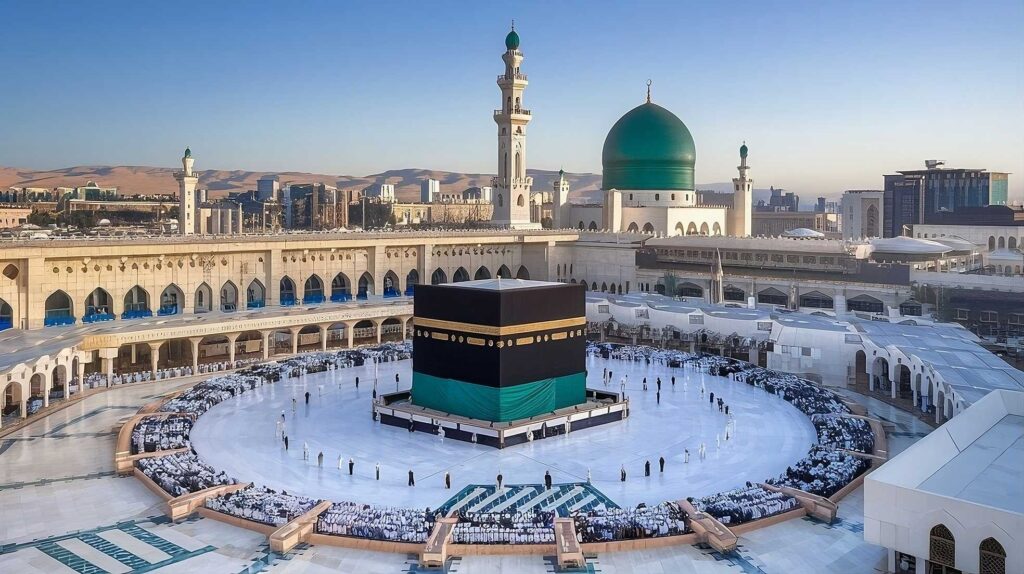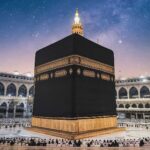بِسْمِ ٱللَّهِ ٱلرَّحْمَـٰنِ ٱلرَّحِيمِ
Allah’s Name to commence with, the Most Gracious, the Most Merciful
Discover foundational Islamic beliefs, Quranic evidence, prophet attributes, and divine guidance to strengthen your faith and understanding.
Key Islamic Beliefs in Islam
Welcome to Part 5 of our “Foundational Islamic Beliefs” series, where we explore the essence of Islamic faith and its timeless teachings. In this part, we will explore: the evidence of the Quran as the book of Allah, and the infallibility of prophets, these insights shed light on the profound Islamic beliefs.
Evidence of Quran as Book of Allah
Belief: The Quran is self-evident as the Book of Allah, boldly announcing it:
وَإِن كُنتُمْ فِى رَيْبٍۢ مِّمَّا نَزَّلْنَا عَلَىٰ عَبْدِنَا فَأْتُوا۟ بِسُورَةٍۢ مِّن مِّثْلِهِۦ وَٱدْعُوا۟ شُهَدَآءَكُم مِّن دُونِ ٱللَّهِ إِن كُنتُمْ صَـٰدِقِينَ ٢٣ فَإِن لَّمْ تَفْعَلُوا۟ وَلَن تَفْعَلُوا۟ فَٱتَّقُوا۟ ٱلنَّارَ ٱلَّتِى وَقُودُهَا ٱلنَّاسُ وَٱلْحِجَارَةُ ۖ أُعِدَّتْ لِلْكَـٰفِرِينَ (And If you have any doubt in that which We have revealed to Our servant (Prophet Muhammad, peace be upon him), then produce a chapter like it. Call upon your supporters other than Allah if you are truthful. But if you fail—and We declare you will never be able to—then fear the Fire fueled by people and stones, prepared for disbelievers.)1
Can Anyone Replicate a Single Verse of the Quran?
Despite relentless efforts by disbelievers, they could not replicate even a single verse of its eloquence and depth. Additionally, unlike earlier scriptures which could only be memorized by Prophets, the Quran can be miraculously memorized by almost every Muslim child.

Belief: The seven widely recognized and authentic recitations of the Quran are all true and without any difference in meaning. They provide ease for the ummah, allowing individuals to recite in the style they find easiest. The Prophet Muhammad (peace be upon him) said: “Indeed, this Quran was revealed in seven dialects, so recite whichever is easiest for you among them.” (Excerpt from Sahih Muslim, Chapter on the Revelation of the Quran in Seven Dialects, Hadith: 818, p. 408).
It is advised to recite the style prevalent in one’s region—such as the Qira’at of Asim narrated by Hafs in South Asia—to avoid public confusion, as denying a recognized recitation out of ignorance could lead to disbelief.
Abrogation in Quran
Belief: The Quran abrogated many rulings from earlier scriptures, and some of its verses abrogated others. As exampled in the Holy Quran: يَـٰٓأَيُّهَا ٱلَّذِينَ ءَامَنُوٓا۟ إِذَا نَـٰجَيْتُمُ ٱلرَّسُولَ فَقَدِّمُوا۟ بَيْنَ يَدَىْ نَجْوَىٰكُمْ صَدَقَةًۭ ۚ ذَٰلِكَ خَيْرٌۭ لَّكُمْ وَأَطْهَرُ ۚ فَإِن لَّمْ تَجِدُوا۟ فَإِنَّ ٱللَّهَ غَفُورٌۭ رَّحِيمٌ (O believers! When you wish to consult secretly with the Messenger, so before you request, give some charity. This is better and much purer for you, then if you do not have the means (to give charity), so Allah is Most Forgiving, Most Merciful).2
The verse initially required giving charity before privately consulting the Prophet (peace be upon him) Later, the requirement was lifted, making it easier for everyone to seek guidance.
Meaning of Abrogation in the Holy Quran
Belief: Abrogation means certain commands were intended for specific periods without specifying their duration. When their time ended, a new ruling was revealed, which seemed to replace the earlier one, but in truth, it clarified that the original command had reached its intended term.
Describing abrogated commands as “invalid” is incorrect. All divine commands are true, and there is no place for falsehood in Allah’s decrees.
Belief: Clear and Ambiguous Verses in the Quran
Some verses in the Quran are straightforward and easily understood (Muhkam). Others are ambiguous (Mutashabih), and their full meaning is known only to Allah and His beloved Prophet (peace and blessings be upon him).

Those who seek to probe the ambiguous verses or speculate on their meanings often have a deviation in their hearts.
Belief: Revelation is Exclusive to Prophets
Prophetic Revelation (Wahi) is exclusive to prophets. Whoever attributes it to anyone other than a prophet is a disbeliever. Even a dream shown to a prophet is a revelation, free from any possibility of falsehood.
Sometimes, Allah inspires pious individuals (Awliya) through dreams or while awake. This is called Ilham. However, there is also satanic inspiration (Wahi Shaytani), where Satan influences individuals such as soothsayers, magicians, and other corrupt people.
Belief: Prophethood is a Divine Gift, Not Earned
Prophethood cannot be achieved through worship, self-discipline, or personal effort. It is a pure gift from Allah, granted to whomever He chooses out of His grace.
However, Allah bestows prophethood only upon individuals who:
- Are free from all vile traits and adorned with noble qualities even before attaining prophethood.
- Have completed all stages of sainthood (Wilayah).
- Are flawless in lineage, physique, speech, actions, and behavior, devoid of anything that could cause dislike or contempt.
- Are endowed with perfect intellect, as the intellect of philosophers and scholars is not even a millionth of their intellect.
Allah declares in the Quran:
–ٱللَّهِ ۘ ٱللَّهُ أَعْلَمُ حَيْثُ يَجْعَلُ رِسَالَتَهُۥ _“Allah knows best where to place His Messengership (i.e., to whom it should be given).”3
–ذَٰلِكَ فَضْلُ ٱللَّهِ يُؤْتِيهِ مَن يَشَآءُ ۚ وَٱللَّهُ ذُو ٱلْفَضْلِ ٱلْعَظِيمِ _“That is the grace of Allah which He bestows it upon whom He wills and Allah is Extremely Bountiful.”4
Whoever claims that prophethood can be attained through personal effort or self-discipline is a disbeliever (Kaafir).
Belief: The Infallibility of Prophets
Belief in the Permanence of Prophethood
Anyone who believes a prophet can lose their status of prophethood is a disbeliever (Kafir).
Necessity of Prophetic Infallibility
Prophets must be infallible (Ma’soom). This infallibility is unique to prophets and angels. No one other than a prophet or an angel can possess this quality. Considering leaders or saints as infallible like prophets is a deviation and misguidance.
Definition of Infallibility in Prophets
Prophetic infallibility means that Allah has promised to protect them, making it impossible for them to commit sins according to Islamic law.
- In contrast, leaders (Imams) and great saints (Awliya) are safeguarded by Allah, and they generally do not commit sins. However, committing sins is not impossible for them in the same way it is for prophets.
Belief: Complete Protection from Sin
Prophets (peace be upon them) are infallible from:
- Shirk and disbelief (before and after prophethood).
- All traits cause people to dislike or distrust them, such as lying, betrayal, or ignorance.
- Actions that are against dignity and decorum.

This infallibility applies: Before and after prophethood (by unanimous agreement).
- To all major sins (Kabair) absolutely.
- To deliberate minor sins (Saghair) before and after prophethood.
This protection is a divine safeguard ensuring their perfection in character and conduct.
Complete Conveyance of Divine Commands
- Allah sent prophets with commands for the guidance of humanity. Prophets delivered every command as revealed to them.
- Whoever claims that a prophet concealed any divine command due to fear or any other reason is a disbeliever.
As stated in the Holy Quran: يَـٰٓأَيُّهَا ٱلرَّسُولُ بَلِّغْ مَآ أُنزِلَ إِلَيْكَ مِن رَّبِّكَ ۖ وَإِن لَّمْ تَفْعَلْ فَمَا بَلَّغْتَ رِسَالَتَهُۥ ۚ وَٱللَّهُ يَعْصِمُكَ مِنَ ٱلنَّاسِ ۗ إِنَّ ٱللَّهَ لَا يَهْدِى ٱلْقَوْمَ ٱلْكَـٰفِرِينَ ۞ (O Messenger, convey whatever has been sent down upon you from your Lord. And if it is not so, you have therefore not conveyed any of His messages. And Allah will protect you from (being martyred by) the people. Indeed, Allah does not guide the disbelievers (due to their stubbornness upon disbelief).5
Belief: Impeccability in Delivering Commands: Prophets are protected from forgetfulness or mistakes in conveying divine commands. It is impossible for them to forget or omit anything related to their duty of delivering Allah’s guidance. Physical Perfection of Prophets: Prophets must be free from diseases or physical conditions, such as leprosy or vitiligo, that cause disgust or aversion.
Belief: Knowledge of the Unseen (Ilm al-Ghaib)
- Allah has granted prophets knowledge of unseen matters as a gift from Him.
- Every particle of the heavens and earth is within the vision of prophets by Allah’s will.
- However, this knowledge is given (Atai), not intrinsic (Zati). Intrinsic knowledge of the unseen belongs only to Allah, as His attributes and perfections are inherent and not granted by anyone.
Those who deny the prophets’ knowledge of the unseen in absolute terms contradict the Quran. Such individuals follow only part of the Quran while rejecting the rest, as Allah warns: “Do you believe in part of the Book and reject part of it?” (Surah Al-Baqarah: 85)
This denial ignores verses affirming that Allah granted prophets unseen knowledge.
Belief: Reconciliation Between Affirmation and Denial of Knowledge
- Denial refers to intrinsic knowledge of the unseen, which is exclusive to Allah.
- Affirmation refers to granted knowledge, which is befitting for prophets and does not contradict Allah’s divinity.
Claiming that prophets’ knowledge of every particle equates them with Allah is false. The knowledge of creation is finite, while Allah’s knowledge is infinite. Equating finite with infinite is illogical and against Islamic belief.
Belief: Role of Prophets in Declaring the Unseen

- Prophets are sent to inform about unseen realities such as Paradise, Hell, resurrection, rewards, and punishments. If these are not the unseen, then what is?
- These unseen matters are beyond human senses and intellect, and revealing them is the core responsibility of prophets.
Belief: Knowledge of Saints (Awliya)
- Saints (Awliya) also receive granted knowledge of the unseen.
- However, their knowledge comes through the mediation of prophets.
This distinction underscores the uniqueness of prophets as the direct recipients of divine revelation and ultimate guides for humanity.
Belief: Superiority of Prophets
The noble prophets are superior to all creation, including the messengers among angels. No saint, no matter how elevated their rank, can ever equal a prophet. Whoever considers a non-prophet, equal to or superior to a prophet is a disbeliever.
Reverence for a prophet is an absolute obligation and is the foundation of all duties. Any slight disrespect or denial of a prophet is an act of disbelief.
From Prophet Adam (peace be upon him) to our Beloved Prophet Muhammad (peace and blessings be upon him), Allah sent numerous prophets. Some are explicitly mentioned in the Holy Quran:
| No. | Prophet’s Name | Arabic Name |
|---|---|---|
| 1 | Prophet Adam | آدم (Adam) |
| 2 | Prophet Noah | نوح (Nuh) |
| 3 | Prophet Abraham | إبراهيم (Ibrahim) |
| 4 | Prophet Ishmael | إسماعيل (Ismail) |
| 5 | Prophet Isaac | إسحاق (Ishaq) |
| 6 | Prophet Jacob | يعقوب (Yaqub) |
| 7 | Prophet Joseph | يوسف (Yusuf) |
| 8 | Prophet Moses | موسى (Musa) |
| 9 | Prophet Aaron | هارون (Harun) |
| 10 | Prophet Shuaib | شعيب (Shuaib) |
| 11 | Prophet Lot | لوط (Lut) |
| 12 | Prophet Hud | هود (Hud) |
| 13 | Prophet David | داود (Dawud) |
| 14 | Prophet Solomon | سليمان (Sulaiman) |
| 15 | Prophet Job | أيوب (Ayyub) |
| 16 | Prophet Zechariah | زكريا (Zakariya) |
| 17 | Prophet John | يحيى (Yahya) |
| 18 | Prophet Jesus | عيسى (Isa) |
| 19 | Prophet Elias | إلياس (Ilyas) |
| 20 | Prophet Elisha | اليسع (Alyasa) |
| 21 | Prophet Jonah | يونس (Yunus) |
| 22 | Prophet Enoch | إدريس (Idris) |
| 23 | Prophet Zhul-Kifl | ذو الكفل (Zhul Kifl) |
| 24 | Prophet Salih | صالح (Salih) |
| 25 | Prophet Uzair | عزير (Uzair) |
| 26 | Prophet Muhammad | محمد (Muhammad) |
These prophets were sent to guide humanity, their reverence is part of the faith.
Frequently Asked Questions
FAQs
What is the evidence that the Quran is the Book of Allah?
The Quran boldly declares itself as the Book of Allah, challenging skeptics to produce even a single chapter like it. Despite their efforts, no one has been able to match its eloquence and depth.
How many recognized recitations of the Quran are there?
The Quran has seven authentic recitations, all of which are valid and without differences in meaning. Muslims are encouraged to recite the version prevalent in their region to avoid confusion.
What is abrogation in the Quran?
Abrogation refers to Allah revealing new rulings to replace earlier ones when the intended period for the original ruling ends. This demonstrates the Quran’s dynamic guidance for changing circumstances.
Are abrogated commands invalid?
No, abrogated commands were true and valid for their intended time. Describing them as invalid is incorrect.
What is the difference between clear and ambiguous verses in the Quran?
Clear (Muhkam) verses are easily understood, while ambiguous (Mutashabih) verses have meanings known only to Allah and His Messenger (peace be upon him).
Is revelation exclusive to prophets?
Yes, divine revelation (Wahi) is exclusive to prophets. Non-prophets may experience inspiration (Ilham), but it is distinct from prophetic revelation.
Can prophethood be earned through personal effort?
No, prophethood is a divine gift from Allah, granted to individuals chosen by Him based on His wisdom and grace.
Are prophets infallible?
Yes, prophets are divinely protected (Ma’soom) from sin, disbelief, and any traits that could undermine their role as moral and spiritual guides.
Do prophets deliver all divine commands to their people?
Yes, prophets deliver every command revealed to them without forgetfulness or fear. Claiming otherwise is disbelief.
Do prophets possess knowledge of the unseen (Ilm al-Ghaib)?
Yes, Allah grants prophets specific knowledge of the unseen. This knowledge is given (Atai), not intrinsic (Zati), and is limited to what Allah wills.
What is the role of prophets in declaring unseen realities?
Prophets inform humanity about unseen matters such as Paradise, Hell, and the resurrection, which are beyond human senses and intellect.
Are prophets superior to all other creation?
Yes, prophets are superior to all creation, including angels and saints. Reverence for prophets is a fundamental aspect of faith.
Why must prophets be physically perfect?
Prophets are free from physical traits or diseases that might cause aversion, ensuring they are ideal role models for human beings and other creatures.
I’ve shared some key foundational beliefs in Islam, with more insights coming soon. Stay connected to deepen your understanding and strengthen your faith. Missed Foundational Islamic Beliefs: Part 4? Click here!
If you have any queries feel free to contact us. Connect through social media handles:



Pingback: Foundational Islamic Beliefs: Part 6 - ISLAMICAGE